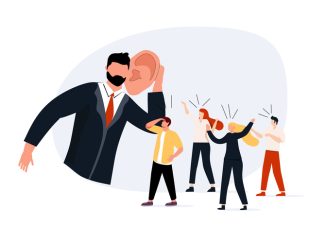
How fine-tuned are your listening skills? Counsellors Laura Harley and Beverley Hills share their top tips on how to become a more active listener
CREDIT: This is an edited version of an article that originally appeared on Happiful
We all like to think we’re good listeners but, when the moment arrives, do we deliver? If you’ve ever found yourself glancing at your ‘phone, planning ahead, or interjecting with personal experiences, the chances are you haven’t been listening as closely as you think.
Listening without judgement can be even trickier. We all have opinions and, when approached by a friend or colleague, we may assume they’re looking for a solution when this isn’t actually the case. Sometimes, we just want to share – and to feel truly heard – without expectation or judgement…but is being a good listener a natural talent, and is it something we can all improve?
What is active listening?
Active listening is all about focusing on, and engaging with, what is being said, paraphrasing the discussion, and reflecting this back – all without offering judgement or advice. Through active listening, we can help others to feel heard and valued. Over time, this can improve our relationships by showing that we are attentive, and care about what others have to say.
Why is it important to be a good listener?
“Have you ever chatted to someone and felt your words were just not sinking in?” counsellor Beverley Hills asks, explaining why it’s so important to develop our listening skills. “They may be playing with their hair or ‘phone. This is called ‘passive listening’; they are not really paying attention, and it leads to you feeling diminished and unimportant – it shuts you down. Active listening is a skill all counsellors learn in order to ensure the client feels heard.”
How to be a better listener
According to online counsellor Laura Harley, when it comes to learning how to be a better listener, practise is key. “Supportive listening is a skill which we become better at the more we practise it,” Laura says. “When we hear a loved one describe something emotive, it can be hard to keep our judgements out of the conversation – naturally, we have personal ideas about the things we have been taught to feel ashamed of, or embarrassed by – but, crucially, supportive listening is about the other person, not us.”
When we’re able to hear what other people have to say without allowing our personal opinions, or biases, to affect the conversation, we demonstrate our skills as a good listener. We may feel a certain way about a situation; however, it may not be an appropriate time to share our thoughts or feelings.
Ensuring we give the person our full attention is an important part, Beverley explains. “This can be conveyed by, among other things, putting down your ‘phone, maintaining eye contact, paraphrasing what’s just been said, and nodding in agreement so the speaker feels heard, understood, validated.
“So many times people appear to be listening but, in fact, they are formulating their own replies, ready to interject when there is a pause. Instead, let the silence continue until the speaker gives you a verbal or non-verbal clue that they are ready to continue. They may look up at you and smile, ask if you understand their viewpoint, or even cry. Whatever they do, it’s their time, their space in which they can be heard.”
Why is it important to become comfortable with silence during conversations?
“What’s happening in this silence is you are giving the speaker time to think, to reflect, to add, to be,” says Beverley. “Think of the silence as a bit of breathing space, helping the speaker reframe.
“It’s good to remember that people reach out to speak with us for all manner of reasons. Not everyone is looking for a solution; sometimes, they just want to be heard. I think that’s something that we can all empathise with.”
Five quick tips to get you started
• Watch and listen for non-verbal cues – pay attention to body language, tone of voice, facial expressions and gestures.
• Don’t interrupt – hold any questions, or attempts to relate, until they’ve finished speaking.
• Give feedback – nod, make noises that encourage them to continue, and avoid fidgeting.
• Paraphrase and reflect – summarise what the other person has said to ensure you are understanding, and show that you’re listening.
• Don’t offer a solution or opinion – unless asked! If in doubt, ask if they want to vent or hear suggestions.
Laura Harley is an online counsellor who works predominantly with millennials and LGBTQ+ people.
Beverley Hills is a counsellor and clinical supervisor, working with psychotherapists, mental health professionals, law firms and counselling trainees.


Be the first to comment